Guardians of the Galaxy – A Very Long Review
Ooh, child. This started as a simple review, intended to be posted the week after the movie was released… but, before I knew what was happening, I had way overshot my self-imposed deadline and was staring down the maw of a 10 page beast. Believe it or not, there are still bits I actually left out of this. Those might be posted at a later date. For now, I hope you enjoy my full and (mostly) unabridged thoughts on a comic book movie with a talking raccoon.
What was cool about seeing Guardians of the Galaxy, for me anyway, was that despite being extremely well versed in Marvel comics, I actually got to experience it from a rare and coveted perspective: that of a typical moviegoer.
I’ve never read a Guardians comic, nor any of the main cast’s solo adventures. The only character I knew anything about was Rocket Raccoon, and only then because his name has been a rallying cry to drum up support for his ailing creator, Bill Mantlo. (Which, if you’re reading this, please read this article by comics scribe Greg Pak to learn Bill’s story and see how you can help.)
Going into the movie, I knew almost nothing about Star-Lord, Drax, Groot, or Gamora, but I did know a little something about Infinity Gems, Celestials, and the Kree… so I got to experience a brand new story with no preconceived notions about how the characters were “supposed” to be behave, while still being able to delight in the small background flourishes. It was, without a doubt, the sweet spot for viewing this movie, and that alone made it one of the most exciting and satisfying experiences I’ve had with with a comic book movie in… well, ever.
So, yes, Guardians of the Galaxy is a wonderful flick, which should surprise no one. As of this writing, the movie is ten days old and making All Of The Money, so if you’re reading this blog, chances are you’ve already seen it.
And if you haven’t seen it, you should. Because, again, if you’re reading this blog, if you’re enjoying Reckstar, it probably means Guardians is in your wheelhouse. If you’re still on the fence — maybe you’re burnt out on superhero movies, or you’re afraid of it being all flash and no substance — consider the following:
Guardians is NOT a superhero movie. Not really. It’s no more about superheroes than are Star Wars, Firefly/Serenity, Farscape, or The Fifth Element.
Guardians is SPACE-OPERA, through and through. That’s what really distinguishes it from the rest of Marvel Entertainment’s cinematic catalogue. Not only did the studio take a risk at the height of their success by giving one of their least-known properties the big budget treatment, they did it while stepping away from the formula that’s brought them all their success. Each of their previous films dances within a different genre; just this year, we had the Marvel superhero version of a tense political thriller (two, actually, but I’ll touch on that later), and before that, they brought us three techno-thrillers, an alien invasion, a war film, and two epic science fantasies (emphasis on the “fantasy”). But, each of those stories had, at its core, a distinctly superheroic premise: a man is granted abilities beyond that of mortal men, and uses them to become a defender of the people.
It’s that trope which Guardians steps away from. Sure, each Guardian (with the exception of their fearless leader) is endowed with a little more intelligence, a little more strength and speed, than mortal men, but they are surrounded by alien races who can all do the same or similar, which raises the standard for physical ability in their world and, more importantly, levels the playing field. What’s more, the way each Guardian initially uses their ability is anything but altruistic. Gamora uses her cybernetically enhanced strength and agility as an assassin. Drax is a super-strong killing machine hellbent on revenge. Rocket is a certifiable genius who drinks too much and hunts bounties. And Groot… well… Groot is Groot.
And then there’s Peter Quill, who calls himself Star-Lord, not the way Peter Parker calls himself Spider-Man, but more the way William McCarty called himself Billy the Kid. Quill is an unrepentant thief and womanizer who owes allegiance to no one but himself. We’ll get back to him later.
The point is, if you get more pleasure from spaceships and aliens than you do from capes and tights, Marvel has made this movie for you.
And if you prefer the thoughtful spectacle of Joss Whedon, Guillermo Del Toro, or Edgar Wright over the mindless spectacle of Michael Bay or whatever director is imitating him this week, then Marvel has REALLY made a movie for you.
So, consider this your spoiler-free review: Guardians of the Galaxy, while not a perfect movie, is a delightful gem of space-faring comedy and adventure. Filled with music, color and surprising emotional complexity; populated by flawed, lovable, memorable characters; lovingly nodding to forebears of the genre while staking its own claim in the grand, fictional cosmos, and reminding us how much damn FUN space ships and laser guns can be.
See it twice.
That’s not all I have to say about this movie, but it’s all I can say without giving away key plot points, so this is your warning:
Beyond this point, there be SPOILERS.
Come And Get Your Love
Okay, let’s dig a little deeper. Yes, Guardians is a funny and exciting adventure movie, but what makes it special isn’t how well it brings the “Ha Ha” and the “Boom Boom!” (Well… not JUST that.) It’s the movie’s willingness and determination to invest us in the emotional life of its characters. Even the raccoon. Even the tree.
Guardians of the Galaxy, at its core, is a movie about people whose personal tragedies have driven them to selfishness, distrust, and isolation. Their journey isn’t just about people uniting to combat a common threat, it’s about how our own hardship, our own pain, is less painful when we have someone to share it with. By the end of the movie, that theme takes on a very literal form.
Where Marvel’s The Avengers was about the birth of a team, Guardians is about family. Not the blood relations you’re born with, but the family we collect when we venture away from home and are lucky enough to find ourselves among friends. Only, this movie takes it a step further by showing how even a bunch of antisocial ne’er-do-wells can still find redemption and belonging. It’s kind of like a support group for habitual assholes. An island of misfit toys… in space.
Anyway.
There are scenes throughout the movie that give us insight into the pain each of these characters carries with them. Each is given a moment to meditate on their pain and then confront it, either wisely or foolishly. And, whether wise or foolish, these moments allow us to empathize with them on a level no Marvel movie has really achieved before now.
I’ll give you an example. By far, the scene that hit me hardest on the first viewing was Rocket’s breakdown in the bar on Knowhere. It comes at an unexpected point — Star-Lord has just utterly failed to hit on Gamora when they hear a commotion coming from the bar. Rocket and Drax, the two hotheads of the group, are brawling with each other (actually, on the second viewing, I realized it’s actually Groot and Drax who are brawling, and THAT’s something I’ll touch on later as well!). You’re expecting this to be sort of a funny action beat meant to reiterate how much these characters DON’T get along, but then it blindsides you with actual pathos.
You see, Rocket is angry. Not just because angry, talking raccoons are funny, but because he has to suffer the indignity of being the butt of every joke, called “vermin” by Drax and “rodent” by Gamora, never taken seriously, all because some scientist somewhere decided to toy with his genetics just to see what would happen. He’s a victim of circumstance, and the only way he can find to guard himself against the cruelty of people is to lash out at them first; to get violent; get mean. Rocket is a stand-in for every person who has ever experienced bullying and discrimination.
And that’s not the only time Rocket brings harsh reality crashing into a scene that would have been generically comedic or heroic in a lesser movie. At the beginning of the third act, the team meets for a final powwow before they head into the big battle. It’s the same “rallying the troops” scene we’ve seen in a million other movies; Star-Lord has had his moral epiphany and is trying to convince the others to take up arms with him. “Fate is giving us a chance… to give a shit,” he proclaims, which, I’ll admit, does throw some refreshing salt into the usual St Crispin’s Day speech. But, again, it’s Rocket who derails the expected tone and takes the scene into Real territory
“But, Quill, defeating Ronan is impossible,” he says. “So, you’re asking us to die.”
There’s no easy answer to that — and there shouldn’t be! The rest of the team is actually struck silent for a moment. They don’t get to rush thoughtlessly into the jaws of death like so many other action heroes before them — they have sit there and face the reality of what they’re about to do. Which makes their inevitable “You have my sword — and my bow — and my axe!” moment feel truly heroic, because the film has allowed each of the characters to acknowledge the fear of what they’re about to do, and to find peace with it. And it’s Rocket who brings them there.
For these reasons and more, Rocket is, hands down, the best character in the movie. Without the talking raccoon, Guardians of the Galaxy would have been a lesser film.
It’s Not Cool to Get Help
Of course, all credit is owed to writer/director James Gunn, who took what could have been a paint-by-numbers action adventure — one I probably still would have loved, not knowing what I’d be missing — and instead chose to create a story with substance, subtext, and nuance. Something chewy.
It’s a chewy flick!
Like, here… chew on this: Groot isn’t just the “soul of the team/movie” — he’s Rocket’s displaced sense of agency.
From the moment we meet Rocket and Groot, they have an almost preternatural ability to communicate with each other, right? Groot says three words (usually), from which anyone might extrapolate an emotion or intent, but only Rocket understands exactly what Groot is saying.
GROOT
“I am GROOT.”
ROCKET
“They ARE ungrateful.”
~*~
GROOT
“I AM Groot.”
ROCKET
“So what if it’s better than 11%!
What the hell does that have to do
with anything?”
Conversely, Groot, in his capacity as Rocket’s “muscle”, knows exactly when he’s needed to step in as an extension of Rocket’s will. Not so much with the fetch errands Rocket sends him on, but unfailingly when it comes to reflex and emotion, which suggests that Groot is a creature that operates on empathy.
Empathy is an important theme in this movie. It’s an elusive quality for each character, with the exception of Groot, who acts as their empathetic proxy (and only by losing that proxy are they able to fully reclaim their own empathy in the end).
Groot’s silent interactions support this.
When first arriving on Knowhere, the team is surrounded by a gaggle of kids in raggedy clothing (presumably the Celestial-head-city equivalent of street rats). Groot stops to offer one a flower grown from his own hand. It’s a sweet moment, but also informative. Look at the girl’s reaction. She’s not just smiling at the flower, she’s captivated by it, unable to take her eyes off it. There’s more than glee or appreciation in her expression; there’s remembrance. That flower means something to her, as Groot knew it would.
Later, Groot looks horrified when he realizes the lizard fights on which everyone is betting result in the deaths of the animals. He feels for the lizards.
He looks aghast when Rocket reacts callously to Drax’s confession about his dead family. He feels for Drax.
When Rocket picks a fight with Drax, it’s Groot who steps in to take the punches.
When the Collector’s assistant sets off the Infinity Stone, Groot is the first to move, and what he does is grab Rocket and run for cover.
Groot understands, at a glance, the needs of each person he encounters, and what Rocket needs is to feel strong, to feel capable, self-sufficient. Which, of course, he is not. Rocket is small, relatively weak of arm, and frail of body. He’s intelligent, yes, but intelligence only goes so far when literal push comes to shove. Rocket is physically and emotionally vulnerable, and Groot gravitates toward that. Groot provides Rocket exactly what he needs: an extension of himself that can be strong, intimidating, and powerful; that can act on his behalf, reflexively, without needing to be asked — because Rocket will never, ever, ask or help.
Furthermore, Groot’s nature allows Rocket to form a carapace around his own empathy. He doesn’t need to worry about hurting other people; Groot does the worrying for him.
(A part of me really loves that James Gunn has turned Groot into a walking, talking embodiment of the theory that plants can sense and react to human emotion. It’s a thoroughly 60s/70s new-agey concept, which fits perfectly with the tone of this movie.)
Groot is, literally, Rocket’s better half.
It’s why Rocket’s first move during the prison break is to join Groot, even though every gun in the room is firing at him.
It’s why Groot joins the rest of the team on the Dark Aster while Rocket remains with the fleet outside. Rocket isn’t just with them in spirit, he’s with them in Groot.
It’s why Rocket is so afraid when Groot starts forming his protective cocoon around the team, even though he knows Groot can regenerate (he even reminds Groot of this earlier in the film).
And it’s why Rocket is almost inconsolable when he sees Groot shattered in the ruins after the crash.
“You killed Groot!” he screams at Ronan.
No he didn’t, Rocket. He killed a part of you. He killed — or at least momentarily crippled — the part of you that allows you to engage with the world with confidence and strength.
Rocket isn’t just afraid for the safety of his friend, he’s terrified of being exposed without his better half to back him up. He’s afraid of being alone, helpless, and incomplete.
Every character in the movie goes through an epiphany where they realize that being together is better than being alone. For Drax, it happens when Rocket scolds him for endangering everyone’s lives in his own pursuit for revenge. For Quill, it happens when he chooses to sacrifice his own life to save Gamora’s. For Gamora, it happens when she realizes Quill was willing to sacrifice his life to save her’s.
But Rocket’s doesn’t come until after the final battle. Even when he’s helping the team defeat Ronan, joining the power chain to help them harness the infinity stone — even then — he’s still acting on instinct, on self-preservation. He’s a smart guy. He knows what needs to be done to defeat the villain. Sure, he’s come to like these people, and his selfish exterior was already beginning to crack when he ordered the Ravagers to protect the city — but at that exact moment, in his heightened emotional state, his sole purpose is to erase Ronan for the role he played in Groot’s (temporary) demise.
No, Rocket’s epiphany doesn’t happen until he’s sitting among the wreckage, crying over the remains of his best friend, and Drax — DRAX — reaches out and comforts him. That’s the moment, and the animation is so beautiful that you can actually see the change in Rocket’s face, in his eyes. Drax’s hand lands on his head, and Rocket suddenly realizes he’s not alone. Where once he only had a big dumb tree to act and feel on his behalf, he now has a family who will shield him, support him, and allow him to act and feel for himself.
Nothing Goes Over My Head
Now, for all that is great about the movie, it’s not without some flaws.
For example, I loved Karen Gillen’s Nebula as a concept and as a visual — and she turns in a fine performance — but the character really isn’t given room to shine. She exists solely as a physical threat and a contrasting element (there, but for the grace of Groot, go I) for Gamora, and once she has served her purpose, the movie literally tosses her out the nearest hole in the wall.
Gunn has said that he wanted Nebula to be the film’s Boba Fett. I don’t think he realizes that that’s not really a good thing. The whole “cool looking, mysterious badass” aspect is great, but, as proven by both Boba Fett and Darth Maul, there needs to be more substance. Nebula gets a little more, but in my estimation, not enough. Her character is given personal stakes and the beginnings of depth, but has no arc to make it all worthwhile. Hopefully she’ll have her moment in Guardians 2 (which has already been announced).
Another weak point for me was the villain we’ve all been waiting to see more of since his teaser cameo at the end of The Avengers. Thanos finally speaks in this movie, complete with voice and motion-capture performance by Josh Brolin, and… he… just… kind of fizzled for me. I like the casting of Brolin in the role. He’s a great actor, and he’s got the deep voice and quiet intensity needed for the character, but… I don’t know. Maybe it’s because of his last-minute casting; maybe he didn’t have enough time to actually create a real character out of Thanos before they stuffed him in a mo-cap suit and put him on camera, but both of his scenes failed to impress me. They felt like line readings. There was no real effort in Brolin’s performance; no nuance beyond “This is where I lower my voice to sound more intimidating.” I even heard a little of his California accent coming through at points, lilting on certain vowels when clear enunciation would have been more effective. That, plus a visual presentation that felt dulled down and a little too human, made Thanos somewhat underwhelming.
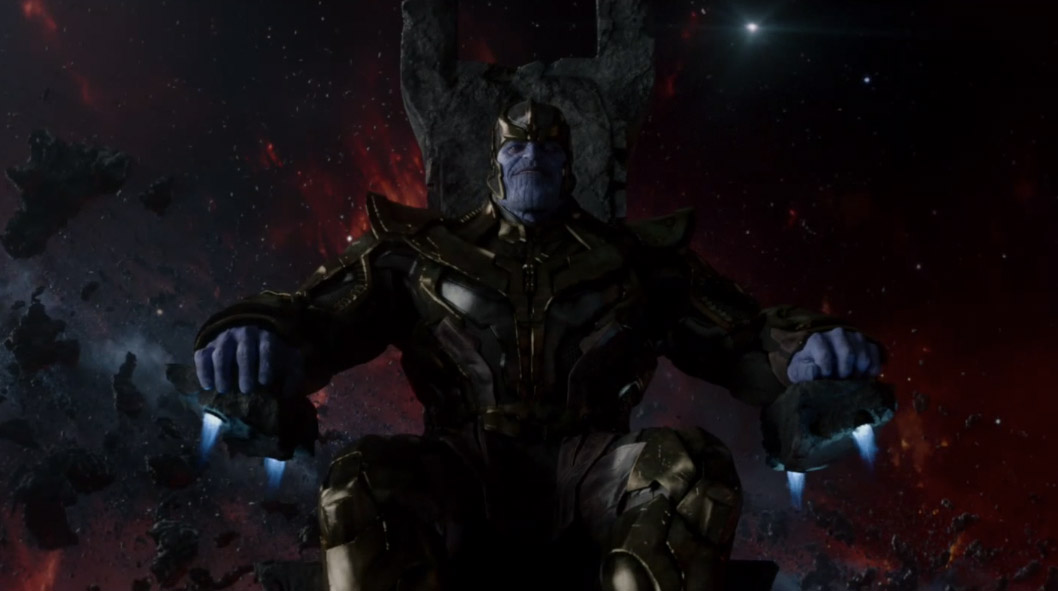
As a fan of the comics, it’s cool to see him on screen, but within the context of the movie, he’s just some dude. As behind-the-scenes bad guys go, he lacks the presence of — and I can’t believe I’m saying this — a Darth Sidious. Everything that’s cool about him comes from the comics, and from the buzz springing from his Avengers cameo, but the movies have yet to give us any self-sustaining reason to really invest in him.
I likewise can’t give Dave Bautista full points for his performance as Drax, though many of his stand-out moments were fantastic. He committed 100% to the overly-literal comedy bits, and even his quiet moments felt soulful and sincere. And for that, I understand why so many cite him as the movie’s breakout performance… but there are other moments, usually when he’s expressing anger, where the performance shows cracks. In those moments, I see the professional wrestler, not the actor. The rage never reaches his eyes, which can be a significant flaw when you’re playing a character who is, in part, defined by his rage.
Of course we forgive him these flaws because the rest of his performance is so spot on. And I even give him extra points because, frankly, I like the dude. He seems like one of the few genuinely decent and humble human beings in Hollywood, and anyone like that deserves all the success they can get. I’m glad he got this role, and like the movie itself, I’m glad he’s being largely heralded for his performance, despite a few flaws.
Lastly, we have the opening scene of the movie. I know this will be a controversial opinion, considering the emotional weight the scene carries, but when we find Peter’s mother in bed, the family surrounding her… it felt more than a little staged and artificial. A little too much dramatic lighting, a little too much gloss in her make-up (or was that CGI?), and none of the performances (with the exception of Gregg Henry, who carries the scene) were overly convincing. It didn’t stop me from buying into the premise, or from investing myself in Peter’s plight, but it was a blemish on an otherwise well-conceived and written scene.
But perhaps that was intentional? A conscious choice allowing the audience to distance themselves from the full brunt of a child watching his mother die from cancer? In a way it reminded me of the WWII opening of Bryan Singer’s original X-Men; presenting one of the darkest moments in history, but maybe with just enough staged melodrama to hold us safely at arms length? Or, maybe these directors had such busy schedules, and were so entrenched in fantasy mode, that they didn’t have the time or presence of mind to make these small but essential scenes feel fully authentic? The world may never know.
Ain’t No Mountain High
Regardless of how you feel about the opening scene in execution, you can’t argue with its function within the script. Namely, the way it sets up everything that will come to define the character of Peter Quill. We see his attachment to the walkman and the mixtape, and that it represents his relationship with his mom. We see his black eye, which he tells her he earned fighting off some boys who were torturing a harmless frog. We see the wrapped gift his mother gives him, telling him not to open it until she’s gone.
Most of this is immediately paid off in the title sequence that follows, where we find adult Peter listening to the same mixtape and kicking harmless lizards aside as he dances through the ruins of a dead civilization. It’s clear that Peter, while having grown older, has not exactly grown up; that he has forgotten the part of himself that was once willing to stand up for the little guy, even when the little guy was just a measly frog. He’s forgotten his empathy. Small animals aren’t things to defend anymore, they’re things to be played with. We soon learn that women are much the same to him; objects to be seduced, used, and then tossed aside.
Peter Quill is a man who has forgotten himself… but why?
The answer resides in the one remaining seed planted in the opening scene. Many reviewers have said the revelation that Peter’s unopened gift is Awesome Mix vol.2 isn’t much of a revelation at all. To those people, I say: it’s not supposed to be. As audiences, I think we’ve become so inured to the “What a tweest!” third act revelation that we mistakenly see them where they aren’t intended, or at least put more emphasis on them than is called for.
It doesn’t matter that WE, the audience, know Awesome Mix vol.2 is in the package. What matters is that Peter’s mother told him to only open it when she was gone… and he still hasn’t. She died right in front of him… but he didn’t open the package. What should that tell you?
Peter’s opening the package isn’t meant to surprise the audience — it’s not even meant to surprise Peter. It’s meant to reveal that Peter has finally accepted his mother’s death. He’s finally let her go.
It also signifies that Peter is embarking on a new chapter of his life. “Star-Lord vol.2,” if you will. The old tape belongs to his past, to his childhood. He may revisit it from time to time, as we all do, but now he’s an adult with a family of his own, and all new musical adventures to discover.
Like I said, it’s a chewy movie.
Ooga-Chaka
A lot has already been said about the movie’s 70s soundtrack and its significance to the story, so I won’t waste any more words on that. That Guardians of the Galaxy: Awesome Mix Vol.1 is currently the number 1 album in America should speak for itself.
The soundtrack also continues the strange 1970s theme that has permeated every Marvel-based movie this year. X-Men: Days of Future Past and Captain America: The Winter Soldier each gave us a variation on the 70s political thriller, while The Amazing Spider-Man 2 translated arguably the biggest Spidey story from the 70s, along with a few fashion tips, to the big screen. And now comes Guardians of the Galaxy, starring characters mostly created (and forgotten) in the 70s, and featuring a soundtrack of infectious 70s pop tunes. Considering this is Marvel’s best year at the movies so far, maybe they should do the unified retro theme more often. (Just imagine everyone’s hair when they throwback to the 80s…)
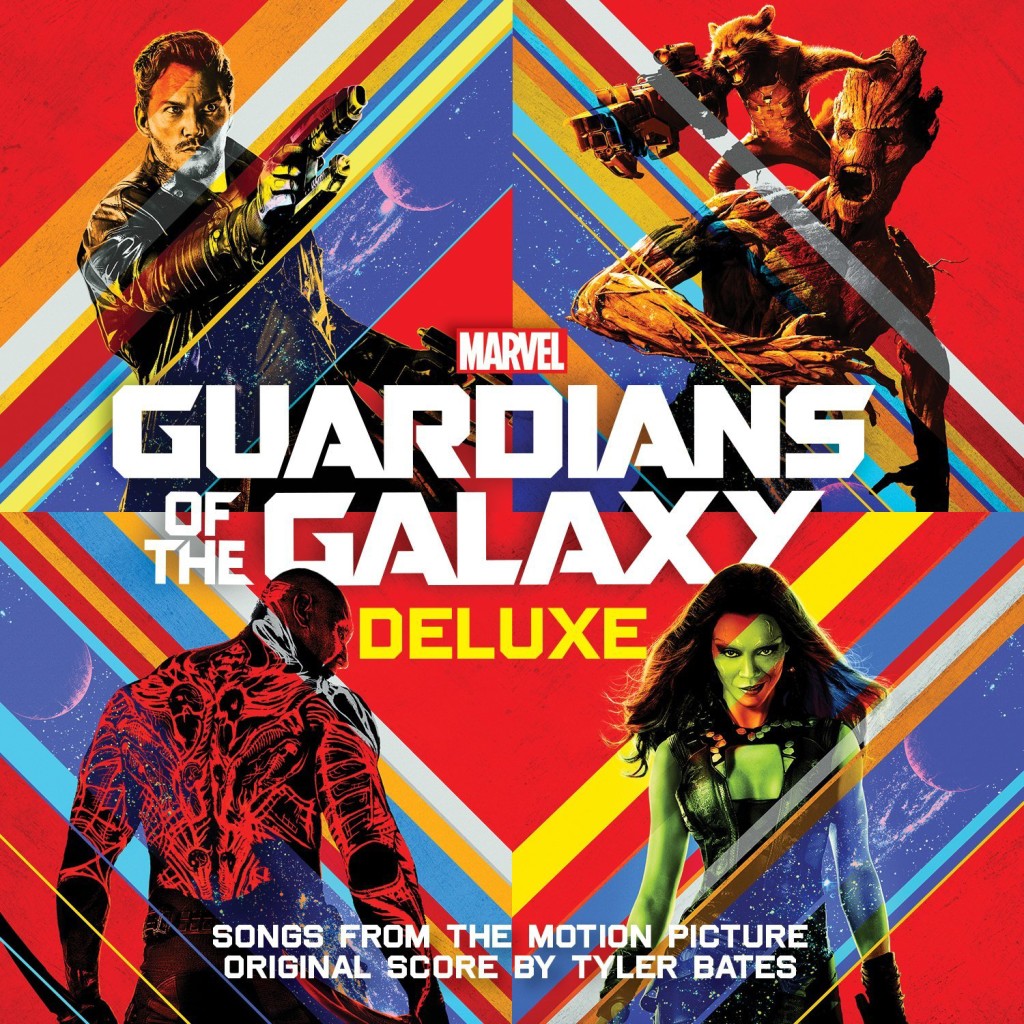
As delightful as the compilation soundtrack is, Tyler Bates’ sweeping orchestral score deserves just as much recognition. The former 300 and Watchmen composer provides perfect accompaniment to the winding story, ably handling the heroic, atmospheric, and emotional moments with classical flair. From the triumphant bombast of “The Kyln Escape” to the fragile beauty of “Groot Spores” and the otherworldly synth pulse of “The Collector”, Bates is turning in some of his best work.
It’s my deepest, purest wish that Marvel will break their shoddy track record for musical inconsistency and let him return to score Guardians 2. He would be the first composer afforded that privilege, which makes me worry that it won’t happen. But Marvel has to realize eventually that a franchise’s musical identity is an essential part of its success. Given the opportunity, Bates could do for Guardians what Williams did for Star Wars, and what Giacchino is doing for Nu Trek.
Things Will Get Brighter
As stated earlier, 2014 has been a pretty damn good year for Marvel at the movies. And, despite the eagerly awaited (by me, anyway) Jupiter Ascending getting bumped to 2015, it’s been a good year for sci-fi as well.
I’ve noticed a steadily building resurgence of the genre in the last few years, with shows like Ascension and The Expanse in development over at Syfy, movies like Guardians, Jupiter, Edge of Tomorrow, and the upcoming comedy, Space Station 76, plus new Star Trek and Star Wars movies on their way, and a staggering amount of comics and webcomics, including Saga, Prophet, Black Science, The Daring Adventures of Android Jones, Perils on Planet X, Space Mullet, One Way, The Galaxy Girls, and the clutch of new Image titles announced at this year’s SDCC… I do believe a new sci-fi/space opera renaissance is upon us. It’s about time.
SO… if you’ve read this far, you are a warrior worthy of praise. Leave a comment below to mark your passing, share your thoughts, agree with me, disagree with me, start a discussion, and most importantly… go see Guardians again.
(also, take care, be well, and thanks for stopping by)
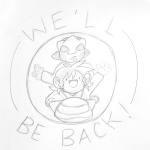
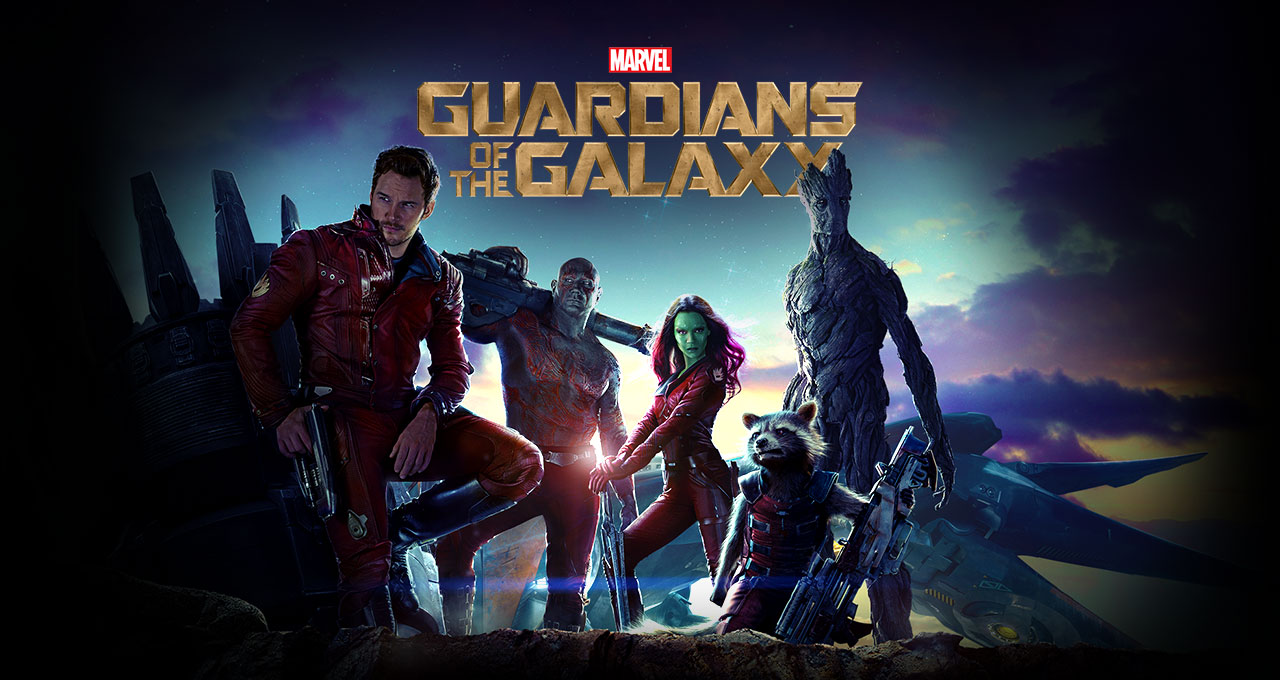
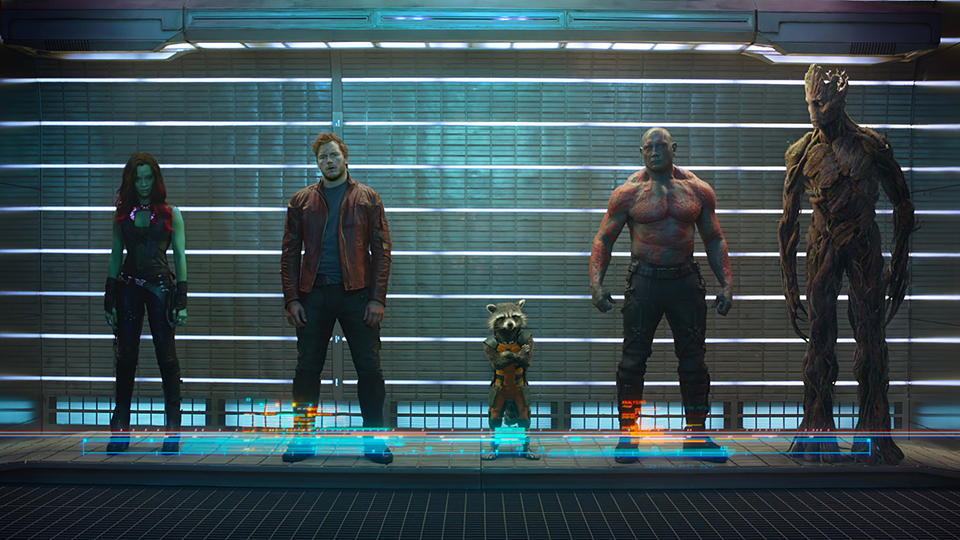
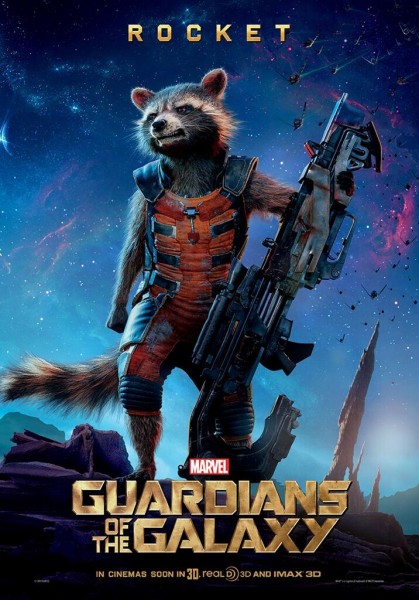
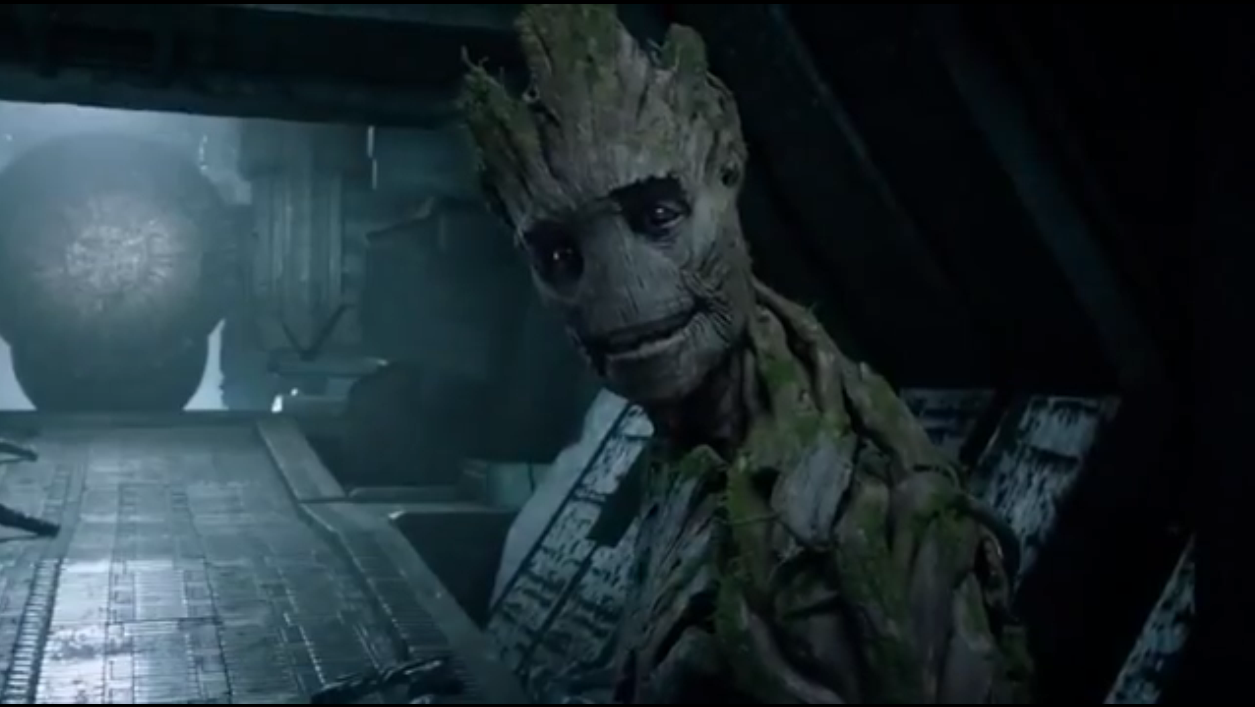
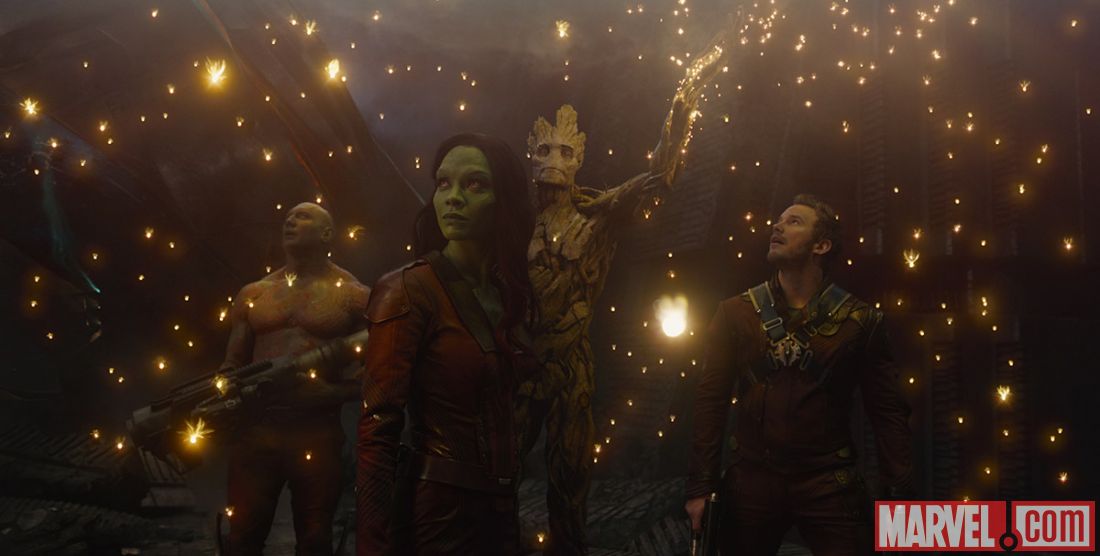
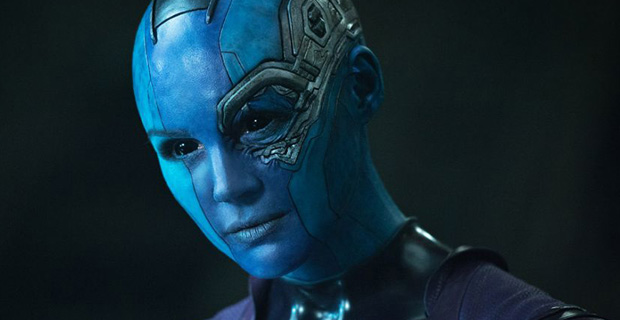
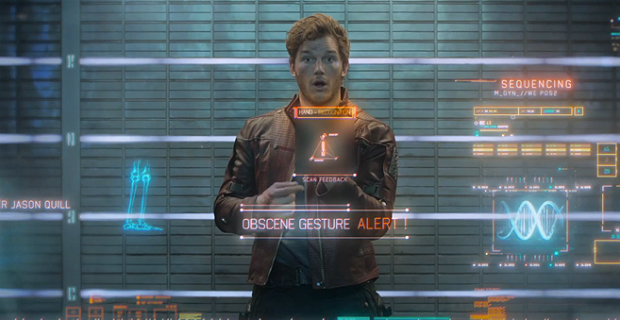




Discussion (6) ¬
I’ll say it first.
TL;DR
I realize you are probably just talking live-action features, but I think the up coming Big Hero 6 should have gotten a mention, too. A friend of mine is working on it, and the early previews look great. I’m proud of Disney for taking a chance to animate a comic, instead of another princess movie. I think the success of Frozen is allowing them to explore and take more risks.
Y’know, I didn’t even think of Big Hero 6 while writing this — for some reason, I thought it was coming out next year? It looks fun! Not an adaptation of the comic so much as an “inspired by the title of” (the original concept is basically the Japanese Avengers), but I’ve enjoyed everything I’ve seen of it thusfar. And, hey! If it’s a success, that’s just one more reason why 2014 is The Year of Marvel.
That said, I don’t know if I’d call it a “risk” per se. I think The Incredibles, Bolt, and Wreck it Ralph have already proven for Disney that animated action adventures can be successful. If anything, I think the real risk would have been making a straight adaptation of the comics, but I can’t blame them for playing it safe their first time out.
Very well said. For me the moment that underscored rockets vulnerability was at the prison. They had just been admitted and given the orange bath. Quill sees rocket after his, rocket moves in such a way to ke that speaks to his emotional state. Groot, for his part, isnt there. This left rocket exposed. The bath, as does with most fluffy furrred pets exposes his true size but also in this case the experimentation that was done to him. Hes a wounded creature body and soul.
Then I read your wonderful analysis of him and groot and their connection. Perfect.
YES. That moment is fantastic, and absolutely revelatory. And I didn’t even think of the significance of Groot’s absence in the scene. It matches up so well!